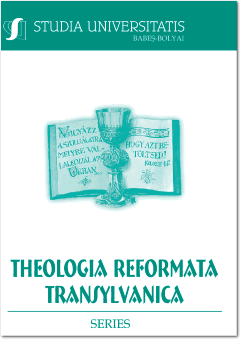A TANÍTVÁNYSÁG ÁRA
THE COST OF DISCIPLESHIP
Author(s): Lészai LehelSubject(s): Christian Theology and Religion, Theology and Religion, Islam studies, Comparative Studies of Religion, Religion and science , Sociology of Religion, History of Religion
Published by: Studia Universitatis Babes-Bolyai
Keywords: disciples; Jesus; sacrifice; self-denial; possession.
Summary/Abstract: The gospels inform us that following the calling of Jesus, the disciples forsook their trade, their homes, and the members of their families. In brief, they left everything behind, what they lived from and for. Jesus says very clearly that following him is only possible, if the one called denies himself and takes his cross up. On the other hand, he promises that he who forsakes his house, or brothers, or sisters, or parents, or children or fields for him will receive a hundred times as much in this present age, with persecution, and later, eternal life as a reward. In Mt 19,28 (cf. Lk 22,29-30, where they receive the promise of the kingdom too), Jesus promises the twelve disciples that they will sit on thrones and that they will judge Israel. If someone leaves his fortune, but sticks to his trade, he can still hope to regain his possessions. The return to a forsaken trade was difficult (Jn 21,2-3), if possible. After leaving possessions and occupation, the forsaking of one’s family follows. This is more difficult, because it demands the undoing of ties of blood which are deeply rooted in humanity. Jesus does not stop here. He goes even deeper in the question of self-giving and self-denial of the nominees for discipleship. Someone, though with a heavy heart, in difficulties could give up everything and everybody who is outside of him, but Jesus asks the utmost here, the called person’s life. Jesus had two kinds of disciples. On one hand, there were those who obeyed the calling and immediately left everything and followed him. On the other hand, others accepted him as their Master and Saviour, but they stayed at home, in the midst of their families and in possession of their properties. These two groups are called the wandering and the sedentary disciples. For the twelve disciples, following Jesus includes the break with the old connections, with those material or family bonds, because the disciple starts an entirely new relationship with Jesus, as their teacher. In the light of 1Cor 9,5, the questions about a radical break with occupations, possessions and families remains open, since Paul mentions that the apostles and Peter took their wives on their mission trips with them. One possible explanation is that when Jesus called the twelve disciples, they had to break with everything which defined their earlier life and follow him this way. On the other hand, there were disciples who served Jesus and his followers with their material goods. After the death and resurrection of Jesus, a different situation pertained, and then the married apostles carried out their service together with their wives. The fact that when the disciples left their wives and children, they were not the only ones to suffer, but so were their relatives, whom they left on their own for a while (until Easter). Another possible explanation could be formed, if we discuss this question in the light of 1Cor 7,29–31 where Paul speaks of a symbolic break.Jesus calls the disciples, and the Twelve breaks with everything what determined their former lives, and follow their master. Their life is characterized by poverty and wandering, while they experience miracles in the company of Jesus. They continue the mission after the death and resurrection of their master. After a while, it starts a process of becoming petty bourgeoisie, during which the second generation of disciples stop wandering and leaving behind possessions, and they live as sedentary disciples in their families.
Journal: Studia Universitatis Babeș - Bolyai Theologia Reformata Transylvanica
- Issue Year: 62/2017
- Issue No: 2
- Page Range: 43-50
- Page Count: 8
- Language: Hungarian

